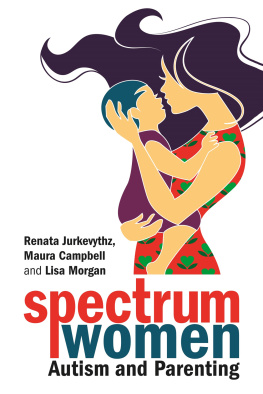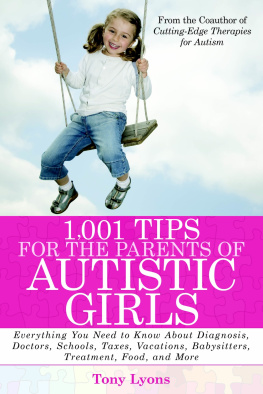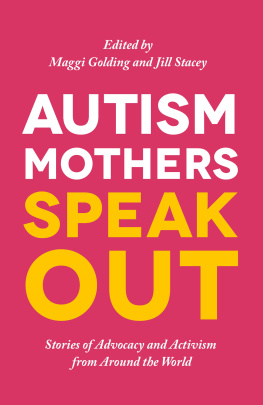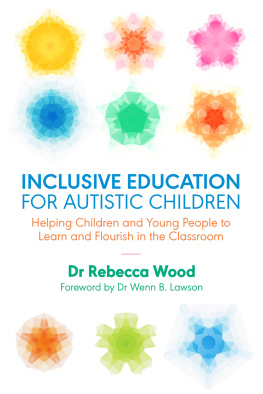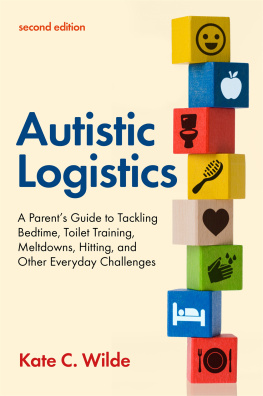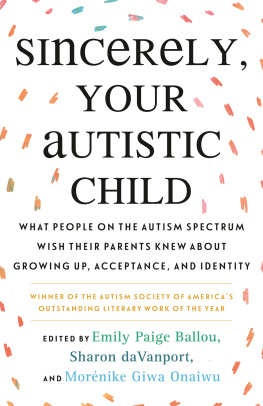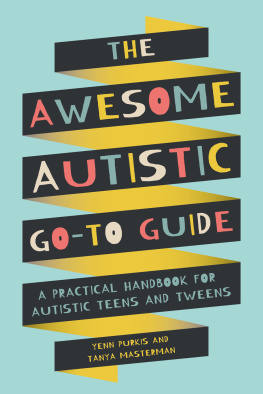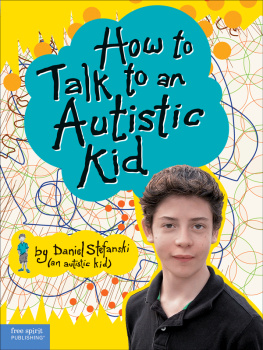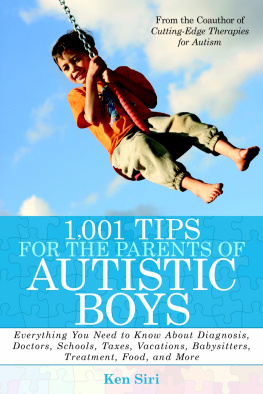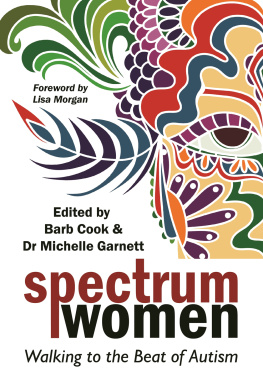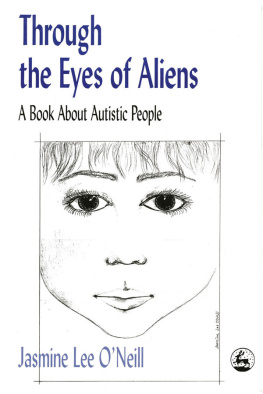Contents

Spectrum
Women
Autism and
Parenting

Renata Jurkevythz, Maura Campbell
and Lisa Morgan
Foreword by Barb Cook

Contents
Foreword
Barb Cook
I sensed I was different. Reflecting on my first memory of looking out the window at the big old tree beside the house I lived in, I remember that it fascinated and enchanted me. The leaves twinkled with sunlight, contrasted by shades of green, grey and black, swaying to their own rhythm in the breeze. Just as I was. I was 11 months old, unaware I was offbeat to the world around me, and to navigate this world I would need someone who understood me. That was my mum.
Unbeknown to both of us, we were on the autism spectrum. Looking back at growing up, I couldnt have asked for a better person, guardian and guide for the early years of my life. Being in tune, understanding our differences from the world, we felt safe with each other in a bond unlike most could comprehend. We were differently the same together.
Before you, in this book, are valuable insights, knowledge and wisdom on parenting. Three autistic women bare all on what life was like growing up as undiagnosed autistics, venturing into and embracing motherhood, and connecting with their children in a unique and powerful way that transcends the norm of parenting. These women discovered their own autistic identity through the diagnosis of their children, a commonality that many parents of autistic children acknowledge and learn about themselves.
This realization through their children brings clarity, an understanding of their own unique differences and an uncanny bond with their autistic children that no therapist, doctor or teacher could ever truly explain through science and academia. The beauty of these bonds and level of understanding provide a way to recognize challenges and strengths that these mothers experienced through their own journey of growing up autistic. Reflecting on the challenges and barriers of school through sensory issues and difference in learning and communication styles gives Renata, Maura and Lisa, the authors of this book, inherent knowledge of why their child is struggling, how to accommodate them and how to implement positive supports from a very early age. Experiencing life growing up without knowledge, support or understanding has ingrained in these mothers that their children shouldnt struggle unnecessarily through their early years, and resoundingly emphasized that their children deserve the same opportunities as all children dothe right to be happy, the right to experience the world as they perceive and to be respected and valued for their differences and experiences that they bring to the world.
This book will bring a clarity and warmth that each mother will find familiarity in, and the reader will feel an enigmatic bond with the authors, and experience a sense of validation and relief through the words on the pages ahead that they know their child and embrace the very essence of who they are.
As a child to an autistic mother, I find comfort and warmth within this book. The authors words fill my soul with a unique connectionthey too were like my mother and share valuable insights into how she perceived the caring and fostering of my wellbeing through my childhood. This book is not just for mothers, but also for the children, autistic or not, of autistic parents. The words will provide a window into the world of autistic parents and an opportunity for a deeper understanding and respect.
It has been 21 years since my own mother passed on, both her and I never having the chance to realize who we truly were, appreciating the strength and beauty we had within, nor having the opportunity to embrace our differences together. It is groundbreaking books like this that provide a doorway to a unique perspective of understanding for autistic parents and the children they care for. Through this book, I find comfort in reflection of my own mother and a sense of affirmation that she knew best for her little girl who was different, but gave her the freedom to be her unique and beautiful self.
Spectrum WomenAutism and Parenting allows the reader to open their heart, to be filled with compassion and validation and to dissipate the fears and concerns imposed by societys expectations. Reading this book will provide a feeling of empowerment that autistic parents are indeed a pillar of strength, wisdom and love to their children. It is time to disperse the myths, break down misconceptions of parenting and welcome the wisdom within these pages as a breath of fresh air. The authors understand and welcome you into their lives. Autistic parentingthey know youve got this.
Barb Cook
Editor and co-author, Spectrum Women: Walking to the Beat of Autism .
Founder of Spectrum Women Magazine .
Authors Note
Before you start reading our book, we would like to explain some of our editorial decisions.
First of all, there are some decisions we made regarding language. When talking about autism, we decided to refer to individuals as autistics instead of people with autism or children with autism. This comes from our personal backgrounds as autistic people who regard our neurology as an inherent part of ourselves. It is not meant to belittle other language choices or impose our point of view. As will be noted throughout the book, we are always writing from our personal perspectives and points of view, so it is only natural that we should use the wording from our daily life when writing. We also use the term spectrum, as in person on the spectrum, since we understand autism as comprising a large group of very diverse people, who are all part of such a spectrum. As writers, we tend to vary our wording to convey more rhythm and coherence to the prose, so that seemed like a good variation when referring to autistic individuals, since it is also a term we use in our daily lives.
Regarding words that differentiate autistics and non-autistics, we decided to use not only these terms but also neurodivergent and neurotypical, since they are currently in common use. When talking about diagnosis, we decided to use the exact terms used by the medical professionals involved, so you will see Asperger syndrome and autism spectrum disorder mentioned, for example. We wanted to stay factually accurate when telling our stories and, for example, references to the autism level (like mild or severe) will also be mentioned for the same reason, which is not to imply that we agree with such descriptors.
Another important point to mention is regarding the description of our childrens experiences. We are particularly protective of their privacy and want to respect their dignity, so when discussing behaviors that are seen as problematic or challenging, we might not detail specific situations or mention names. Some of our children are old enough or developmentally able to read what we write here; others are not. Regardless of whether they can understand it today or in the future, we want to put ourselves in their places, so whatever would feel uncomfortable and embarrassing for us could potentially feel the same to them.
A last note: some themes already discussed in the previous Spectrum Women book will show up here, most notably in , but with a different approach, since the focus of that chapter is to provide direct advice to parents raising an autistic child, complementing the description of personal experiences of adults on the spectrum contained in the first book. The idea is to have both sources adding to each other, so reading them feels like an expansion of the subject, with different points of view.

